Detailed Report: Contemporary Hospitality Industry Evaluation
VerifiedAdded on 2020/10/04
|9
|2526
|78
Report
AI Summary
This report provides a comprehensive overview of the contemporary hospitality industry. It begins with an introduction to the industry, followed by an evaluation of its size, scope, and ownership structures, including partnerships, leasing, franchising, and contracts. The report then delves into the organizational structures within the industry, such as functional, divisional, and flat structures, and examines the roles of various hospitality and professional bodies like the Association of Independent Tour Operators and the British Council. The second part of the report focuses on staffing requirements, evaluating the needs of different hospitality businesses and detailing the roles, responsibilities, and qualifications of various staff members, including HR managers, food and beverage staff, and customer service managers. The report concludes by summarizing the key findings and discussing the current trends and developments affecting the hotel industry.
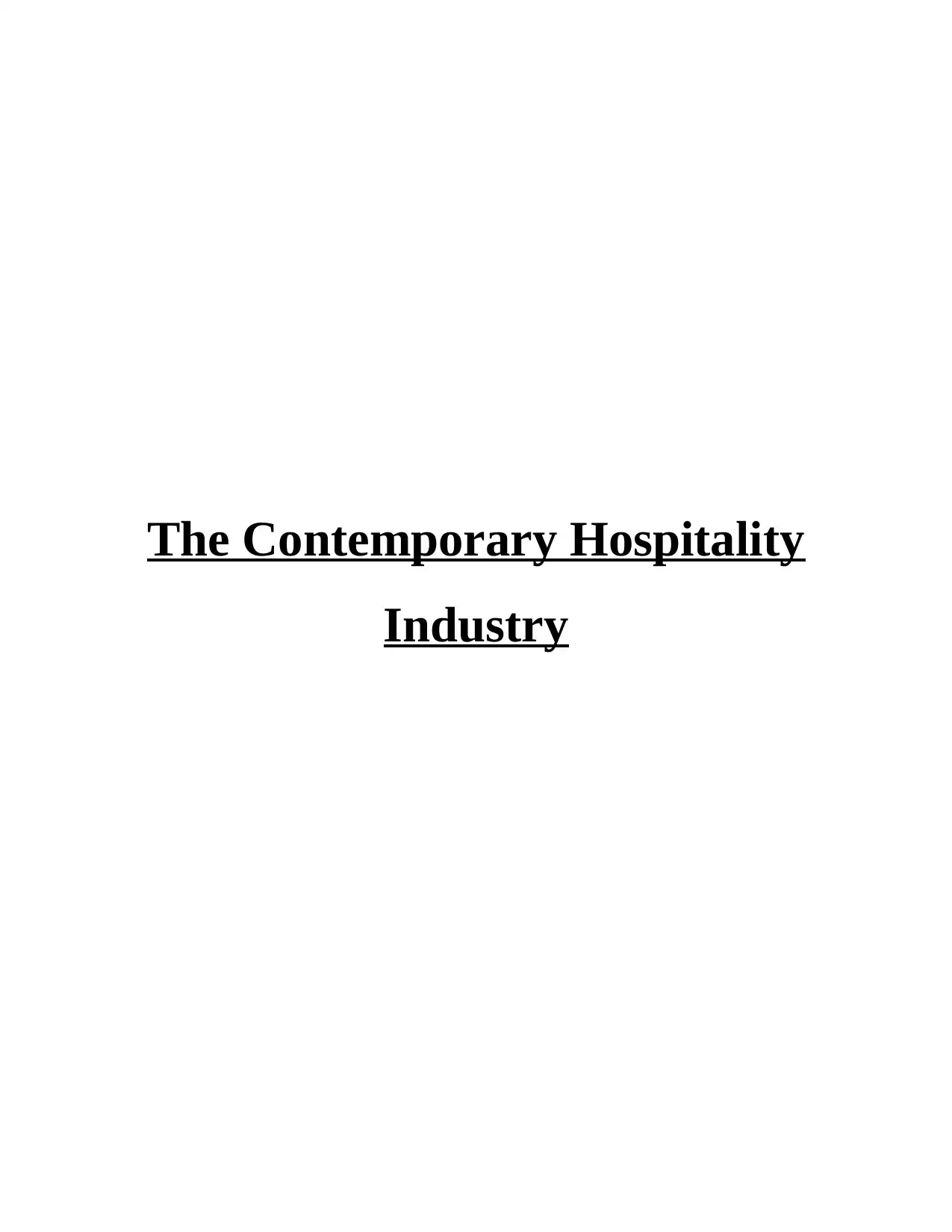
The Contemporary Hospitality
Industry
Industry
Paraphrase This Document
Need a fresh take? Get an instant paraphrase of this document with our AI Paraphraser
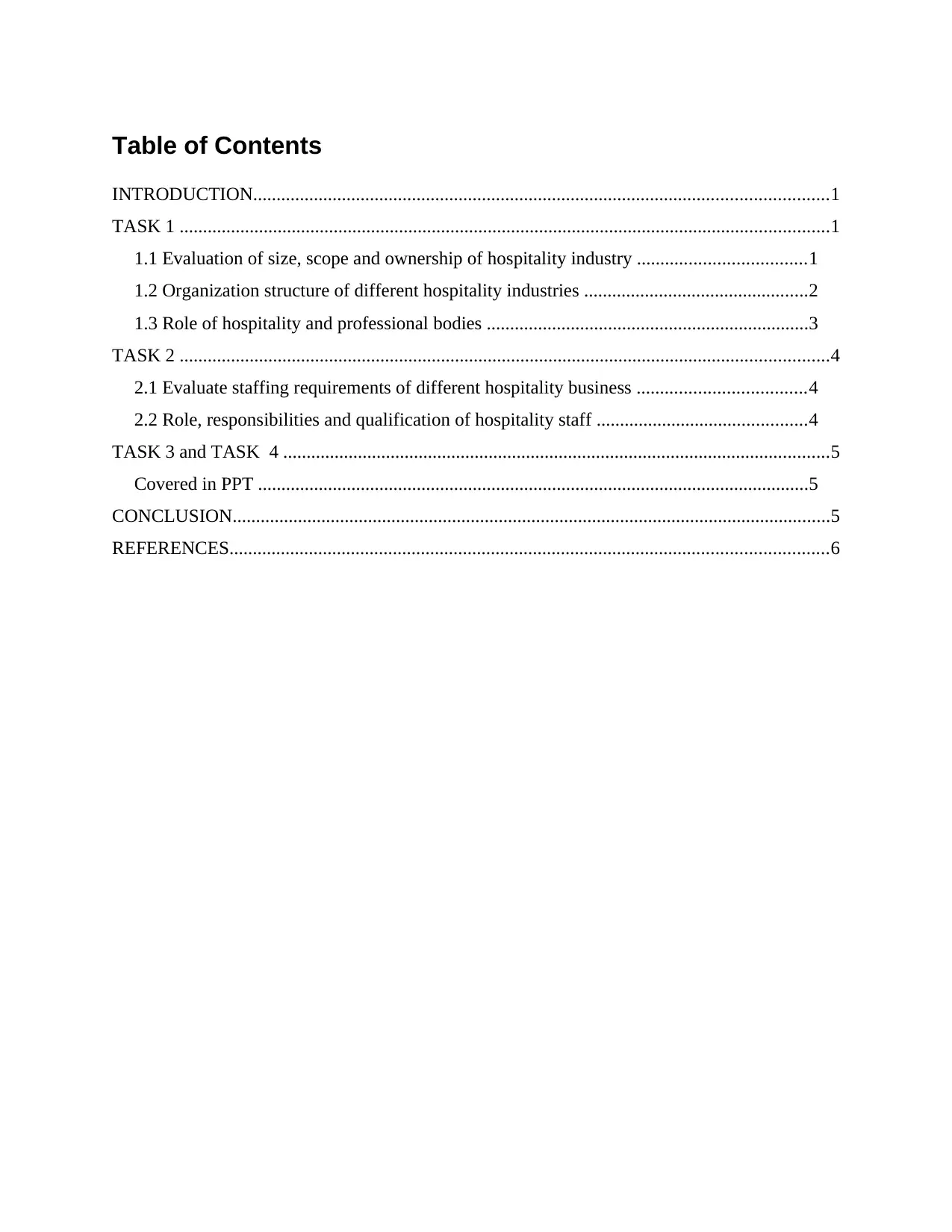
Table of Contents
INTRODUCTION...........................................................................................................................1
TASK 1 ...........................................................................................................................................1
1.1 Evaluation of size, scope and ownership of hospitality industry ....................................1
1.2 Organization structure of different hospitality industries ................................................2
1.3 Role of hospitality and professional bodies .....................................................................3
TASK 2 ...........................................................................................................................................4
2.1 Evaluate staffing requirements of different hospitality business ....................................4
2.2 Role, responsibilities and qualification of hospitality staff .............................................4
TASK 3 and TASK 4 .....................................................................................................................5
Covered in PPT ......................................................................................................................5
CONCLUSION................................................................................................................................5
REFERENCES................................................................................................................................6
INTRODUCTION...........................................................................................................................1
TASK 1 ...........................................................................................................................................1
1.1 Evaluation of size, scope and ownership of hospitality industry ....................................1
1.2 Organization structure of different hospitality industries ................................................2
1.3 Role of hospitality and professional bodies .....................................................................3
TASK 2 ...........................................................................................................................................4
2.1 Evaluate staffing requirements of different hospitality business ....................................4
2.2 Role, responsibilities and qualification of hospitality staff .............................................4
TASK 3 and TASK 4 .....................................................................................................................5
Covered in PPT ......................................................................................................................5
CONCLUSION................................................................................................................................5
REFERENCES................................................................................................................................6
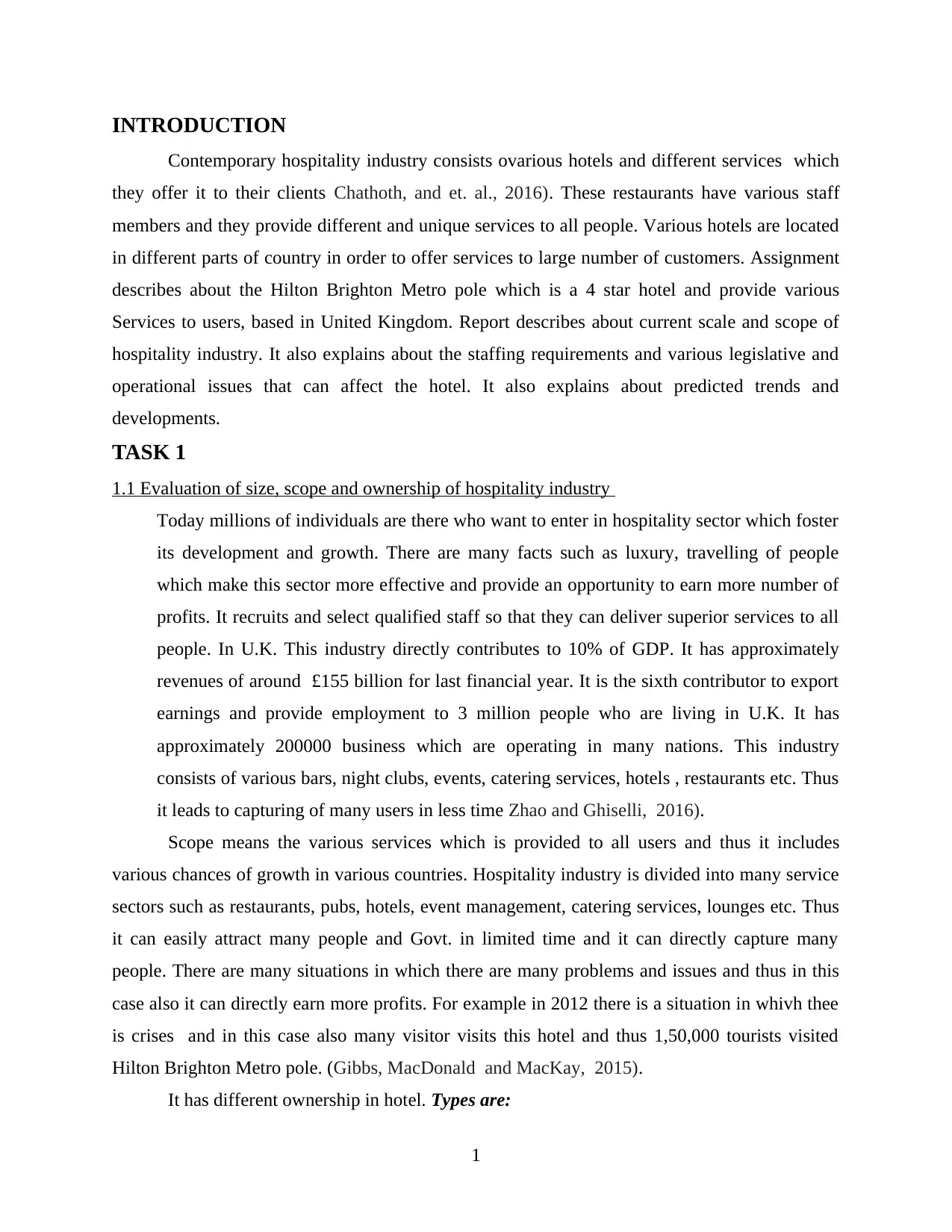
INTRODUCTION
Contemporary hospitality industry consists ovarious hotels and different services which
they offer it to their clients Chathoth, and et. al., 2016). These restaurants have various staff
members and they provide different and unique services to all people. Various hotels are located
in different parts of country in order to offer services to large number of customers. Assignment
describes about the Hilton Brighton Metro pole which is a 4 star hotel and provide various
Services to users, based in United Kingdom. Report describes about current scale and scope of
hospitality industry. It also explains about the staffing requirements and various legislative and
operational issues that can affect the hotel. It also explains about predicted trends and
developments.
TASK 1
1.1 Evaluation of size, scope and ownership of hospitality industry
Today millions of individuals are there who want to enter in hospitality sector which foster
its development and growth. There are many facts such as luxury, travelling of people
which make this sector more effective and provide an opportunity to earn more number of
profits. It recruits and select qualified staff so that they can deliver superior services to all
people. In U.K. This industry directly contributes to 10% of GDP. It has approximately
revenues of around £155 billion for last financial year. It is the sixth contributor to export
earnings and provide employment to 3 million people who are living in U.K. It has
approximately 200000 business which are operating in many nations. This industry
consists of various bars, night clubs, events, catering services, hotels , restaurants etc. Thus
it leads to capturing of many users in less time Zhao and Ghiselli, 2016).
Scope means the various services which is provided to all users and thus it includes
various chances of growth in various countries. Hospitality industry is divided into many service
sectors such as restaurants, pubs, hotels, event management, catering services, lounges etc. Thus
it can easily attract many people and Govt. in limited time and it can directly capture many
people. There are many situations in which there are many problems and issues and thus in this
case also it can directly earn more profits. For example in 2012 there is a situation in whivh thee
is crises and in this case also many visitor visits this hotel and thus 1,50,000 tourists visited
Hilton Brighton Metro pole. (Gibbs, MacDonald and MacKay, 2015).
It has different ownership in hotel. Types are:
1
Contemporary hospitality industry consists ovarious hotels and different services which
they offer it to their clients Chathoth, and et. al., 2016). These restaurants have various staff
members and they provide different and unique services to all people. Various hotels are located
in different parts of country in order to offer services to large number of customers. Assignment
describes about the Hilton Brighton Metro pole which is a 4 star hotel and provide various
Services to users, based in United Kingdom. Report describes about current scale and scope of
hospitality industry. It also explains about the staffing requirements and various legislative and
operational issues that can affect the hotel. It also explains about predicted trends and
developments.
TASK 1
1.1 Evaluation of size, scope and ownership of hospitality industry
Today millions of individuals are there who want to enter in hospitality sector which foster
its development and growth. There are many facts such as luxury, travelling of people
which make this sector more effective and provide an opportunity to earn more number of
profits. It recruits and select qualified staff so that they can deliver superior services to all
people. In U.K. This industry directly contributes to 10% of GDP. It has approximately
revenues of around £155 billion for last financial year. It is the sixth contributor to export
earnings and provide employment to 3 million people who are living in U.K. It has
approximately 200000 business which are operating in many nations. This industry
consists of various bars, night clubs, events, catering services, hotels , restaurants etc. Thus
it leads to capturing of many users in less time Zhao and Ghiselli, 2016).
Scope means the various services which is provided to all users and thus it includes
various chances of growth in various countries. Hospitality industry is divided into many service
sectors such as restaurants, pubs, hotels, event management, catering services, lounges etc. Thus
it can easily attract many people and Govt. in limited time and it can directly capture many
people. There are many situations in which there are many problems and issues and thus in this
case also it can directly earn more profits. For example in 2012 there is a situation in whivh thee
is crises and in this case also many visitor visits this hotel and thus 1,50,000 tourists visited
Hilton Brighton Metro pole. (Gibbs, MacDonald and MacKay, 2015).
It has different ownership in hotel. Types are:
1
⊘ This is a preview!⊘
Do you want full access?
Subscribe today to unlock all pages.

Trusted by 1+ million students worldwide
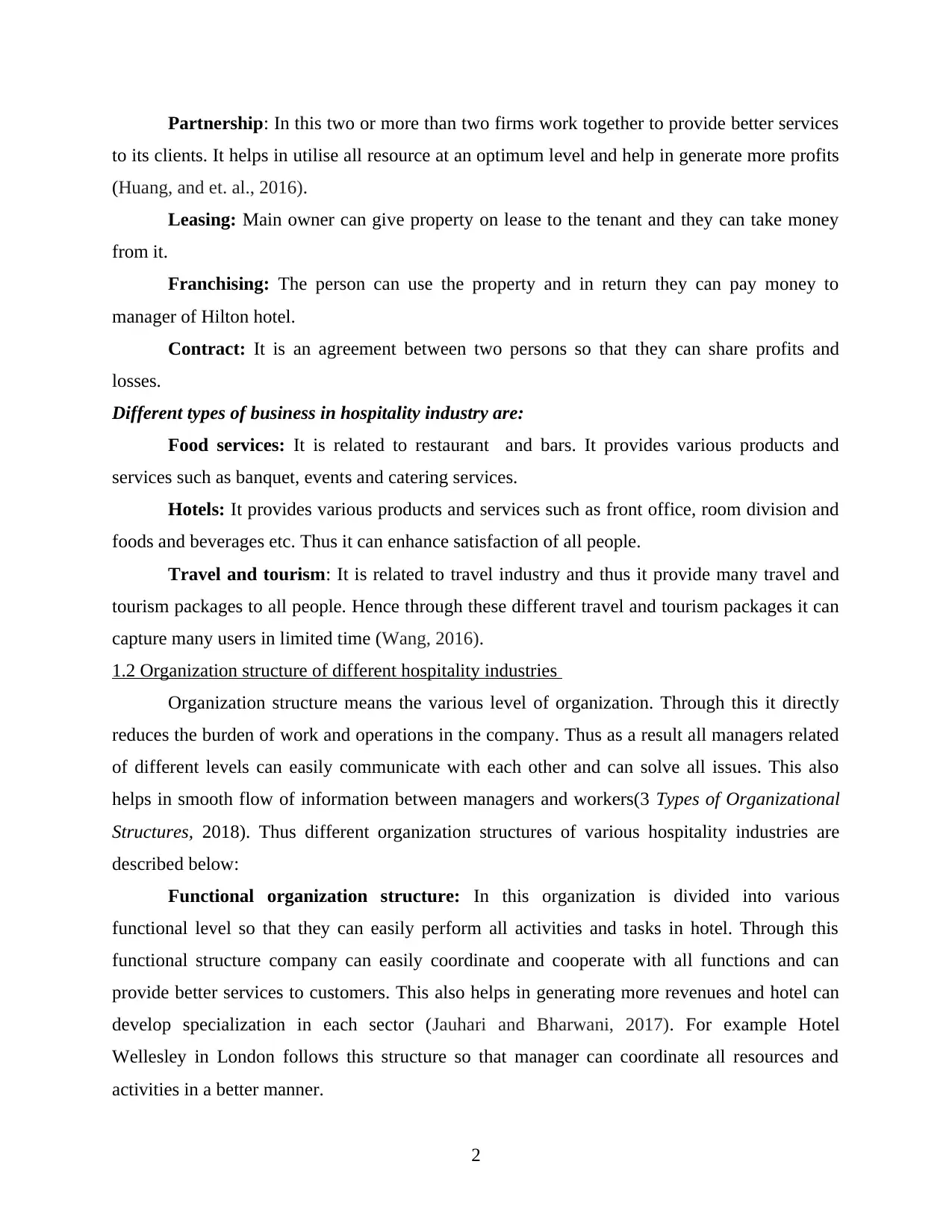
Partnership: In this two or more than two firms work together to provide better services
to its clients. It helps in utilise all resource at an optimum level and help in generate more profits
(Huang, and et. al., 2016).
Leasing: Main owner can give property on lease to the tenant and they can take money
from it.
Franchising: The person can use the property and in return they can pay money to
manager of Hilton hotel.
Contract: It is an agreement between two persons so that they can share profits and
losses.
Different types of business in hospitality industry are:
Food services: It is related to restaurant and bars. It provides various products and
services such as banquet, events and catering services.
Hotels: It provides various products and services such as front office, room division and
foods and beverages etc. Thus it can enhance satisfaction of all people.
Travel and tourism: It is related to travel industry and thus it provide many travel and
tourism packages to all people. Hence through these different travel and tourism packages it can
capture many users in limited time (Wang, 2016).
1.2 Organization structure of different hospitality industries
Organization structure means the various level of organization. Through this it directly
reduces the burden of work and operations in the company. Thus as a result all managers related
of different levels can easily communicate with each other and can solve all issues. This also
helps in smooth flow of information between managers and workers(3 Types of Organizational
Structures, 2018). Thus different organization structures of various hospitality industries are
described below:
Functional organization structure: In this organization is divided into various
functional level so that they can easily perform all activities and tasks in hotel. Through this
functional structure company can easily coordinate and cooperate with all functions and can
provide better services to customers. This also helps in generating more revenues and hotel can
develop specialization in each sector (Jauhari and Bharwani, 2017). For example Hotel
Wellesley in London follows this structure so that manager can coordinate all resources and
activities in a better manner.
2
to its clients. It helps in utilise all resource at an optimum level and help in generate more profits
(Huang, and et. al., 2016).
Leasing: Main owner can give property on lease to the tenant and they can take money
from it.
Franchising: The person can use the property and in return they can pay money to
manager of Hilton hotel.
Contract: It is an agreement between two persons so that they can share profits and
losses.
Different types of business in hospitality industry are:
Food services: It is related to restaurant and bars. It provides various products and
services such as banquet, events and catering services.
Hotels: It provides various products and services such as front office, room division and
foods and beverages etc. Thus it can enhance satisfaction of all people.
Travel and tourism: It is related to travel industry and thus it provide many travel and
tourism packages to all people. Hence through these different travel and tourism packages it can
capture many users in limited time (Wang, 2016).
1.2 Organization structure of different hospitality industries
Organization structure means the various level of organization. Through this it directly
reduces the burden of work and operations in the company. Thus as a result all managers related
of different levels can easily communicate with each other and can solve all issues. This also
helps in smooth flow of information between managers and workers(3 Types of Organizational
Structures, 2018). Thus different organization structures of various hospitality industries are
described below:
Functional organization structure: In this organization is divided into various
functional level so that they can easily perform all activities and tasks in hotel. Through this
functional structure company can easily coordinate and cooperate with all functions and can
provide better services to customers. This also helps in generating more revenues and hotel can
develop specialization in each sector (Jauhari and Bharwani, 2017). For example Hotel
Wellesley in London follows this structure so that manager can coordinate all resources and
activities in a better manner.
2
Paraphrase This Document
Need a fresh take? Get an instant paraphrase of this document with our AI Paraphraser
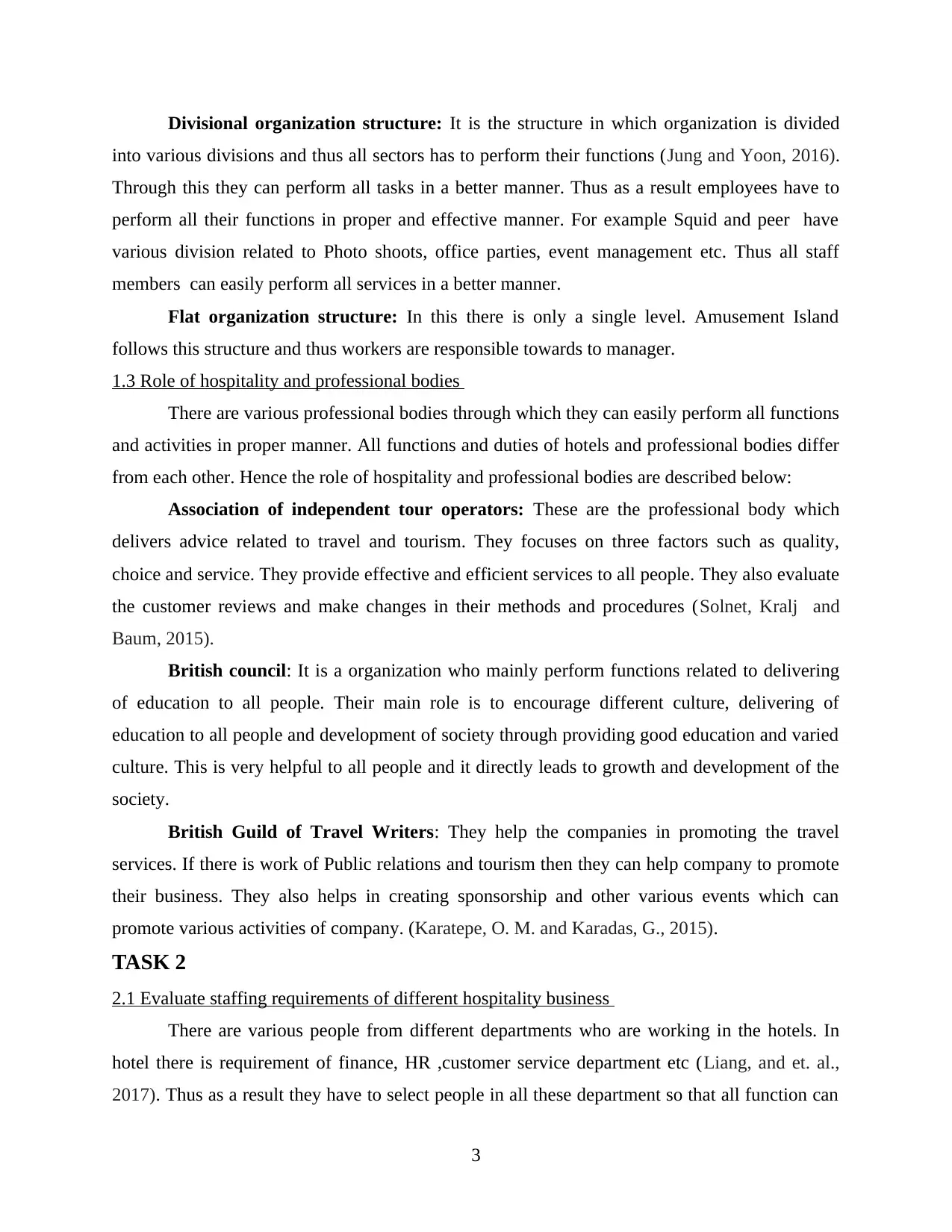
Divisional organization structure: It is the structure in which organization is divided
into various divisions and thus all sectors has to perform their functions (Jung and Yoon, 2016).
Through this they can perform all tasks in a better manner. Thus as a result employees have to
perform all their functions in proper and effective manner. For example Squid and peer have
various division related to Photo shoots, office parties, event management etc. Thus all staff
members can easily perform all services in a better manner.
Flat organization structure: In this there is only a single level. Amusement Island
follows this structure and thus workers are responsible towards to manager.
1.3 Role of hospitality and professional bodies
There are various professional bodies through which they can easily perform all functions
and activities in proper manner. All functions and duties of hotels and professional bodies differ
from each other. Hence the role of hospitality and professional bodies are described below:
Association of independent tour operators: These are the professional body which
delivers advice related to travel and tourism. They focuses on three factors such as quality,
choice and service. They provide effective and efficient services to all people. They also evaluate
the customer reviews and make changes in their methods and procedures (Solnet, Kralj and
Baum, 2015).
British council: It is a organization who mainly perform functions related to delivering
of education to all people. Their main role is to encourage different culture, delivering of
education to all people and development of society through providing good education and varied
culture. This is very helpful to all people and it directly leads to growth and development of the
society.
British Guild of Travel Writers: They help the companies in promoting the travel
services. If there is work of Public relations and tourism then they can help company to promote
their business. They also helps in creating sponsorship and other various events which can
promote various activities of company. (Karatepe, O. M. and Karadas, G., 2015).
TASK 2
2.1 Evaluate staffing requirements of different hospitality business
There are various people from different departments who are working in the hotels. In
hotel there is requirement of finance, HR ,customer service department etc (Liang, and et. al.,
2017). Thus as a result they have to select people in all these department so that all function can
3
into various divisions and thus all sectors has to perform their functions (Jung and Yoon, 2016).
Through this they can perform all tasks in a better manner. Thus as a result employees have to
perform all their functions in proper and effective manner. For example Squid and peer have
various division related to Photo shoots, office parties, event management etc. Thus all staff
members can easily perform all services in a better manner.
Flat organization structure: In this there is only a single level. Amusement Island
follows this structure and thus workers are responsible towards to manager.
1.3 Role of hospitality and professional bodies
There are various professional bodies through which they can easily perform all functions
and activities in proper manner. All functions and duties of hotels and professional bodies differ
from each other. Hence the role of hospitality and professional bodies are described below:
Association of independent tour operators: These are the professional body which
delivers advice related to travel and tourism. They focuses on three factors such as quality,
choice and service. They provide effective and efficient services to all people. They also evaluate
the customer reviews and make changes in their methods and procedures (Solnet, Kralj and
Baum, 2015).
British council: It is a organization who mainly perform functions related to delivering
of education to all people. Their main role is to encourage different culture, delivering of
education to all people and development of society through providing good education and varied
culture. This is very helpful to all people and it directly leads to growth and development of the
society.
British Guild of Travel Writers: They help the companies in promoting the travel
services. If there is work of Public relations and tourism then they can help company to promote
their business. They also helps in creating sponsorship and other various events which can
promote various activities of company. (Karatepe, O. M. and Karadas, G., 2015).
TASK 2
2.1 Evaluate staffing requirements of different hospitality business
There are various people from different departments who are working in the hotels. In
hotel there is requirement of finance, HR ,customer service department etc (Liang, and et. al.,
2017). Thus as a result they have to select people in all these department so that all function can
3
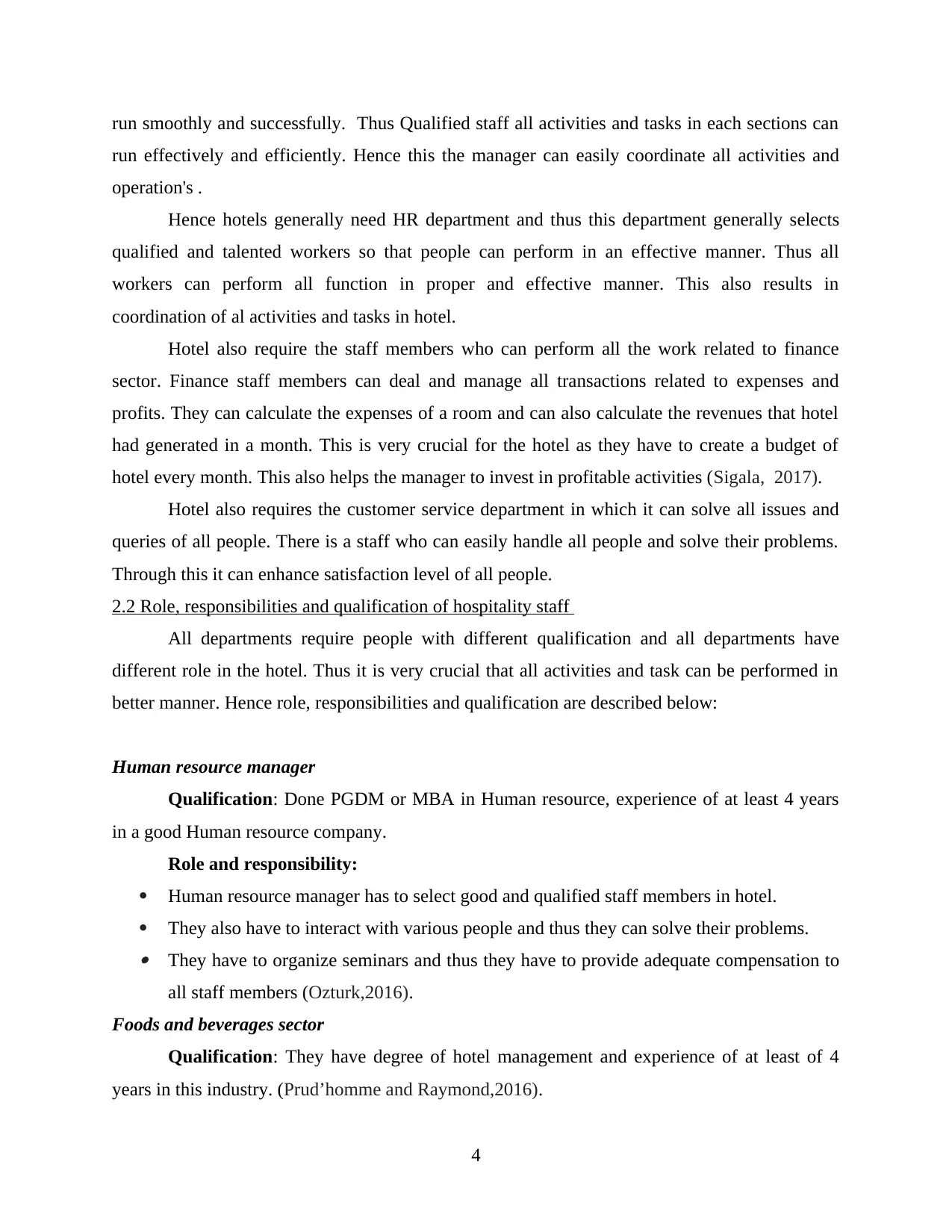
run smoothly and successfully. Thus Qualified staff all activities and tasks in each sections can
run effectively and efficiently. Hence this the manager can easily coordinate all activities and
operation's .
Hence hotels generally need HR department and thus this department generally selects
qualified and talented workers so that people can perform in an effective manner. Thus all
workers can perform all function in proper and effective manner. This also results in
coordination of al activities and tasks in hotel.
Hotel also require the staff members who can perform all the work related to finance
sector. Finance staff members can deal and manage all transactions related to expenses and
profits. They can calculate the expenses of a room and can also calculate the revenues that hotel
had generated in a month. This is very crucial for the hotel as they have to create a budget of
hotel every month. This also helps the manager to invest in profitable activities (Sigala, 2017).
Hotel also requires the customer service department in which it can solve all issues and
queries of all people. There is a staff who can easily handle all people and solve their problems.
Through this it can enhance satisfaction level of all people.
2.2 Role, responsibilities and qualification of hospitality staff
All departments require people with different qualification and all departments have
different role in the hotel. Thus it is very crucial that all activities and task can be performed in
better manner. Hence role, responsibilities and qualification are described below:
Human resource manager
Qualification: Done PGDM or MBA in Human resource, experience of at least 4 years
in a good Human resource company.
Role and responsibility:
Human resource manager has to select good and qualified staff members in hotel.
They also have to interact with various people and thus they can solve their problems. They have to organize seminars and thus they have to provide adequate compensation to
all staff members (Ozturk,2016).
Foods and beverages sector
Qualification: They have degree of hotel management and experience of at least of 4
years in this industry. (Prud’homme and Raymond,2016).
4
run effectively and efficiently. Hence this the manager can easily coordinate all activities and
operation's .
Hence hotels generally need HR department and thus this department generally selects
qualified and talented workers so that people can perform in an effective manner. Thus all
workers can perform all function in proper and effective manner. This also results in
coordination of al activities and tasks in hotel.
Hotel also require the staff members who can perform all the work related to finance
sector. Finance staff members can deal and manage all transactions related to expenses and
profits. They can calculate the expenses of a room and can also calculate the revenues that hotel
had generated in a month. This is very crucial for the hotel as they have to create a budget of
hotel every month. This also helps the manager to invest in profitable activities (Sigala, 2017).
Hotel also requires the customer service department in which it can solve all issues and
queries of all people. There is a staff who can easily handle all people and solve their problems.
Through this it can enhance satisfaction level of all people.
2.2 Role, responsibilities and qualification of hospitality staff
All departments require people with different qualification and all departments have
different role in the hotel. Thus it is very crucial that all activities and task can be performed in
better manner. Hence role, responsibilities and qualification are described below:
Human resource manager
Qualification: Done PGDM or MBA in Human resource, experience of at least 4 years
in a good Human resource company.
Role and responsibility:
Human resource manager has to select good and qualified staff members in hotel.
They also have to interact with various people and thus they can solve their problems. They have to organize seminars and thus they have to provide adequate compensation to
all staff members (Ozturk,2016).
Foods and beverages sector
Qualification: They have degree of hotel management and experience of at least of 4
years in this industry. (Prud’homme and Raymond,2016).
4
⊘ This is a preview!⊘
Do you want full access?
Subscribe today to unlock all pages.

Trusted by 1+ million students worldwide
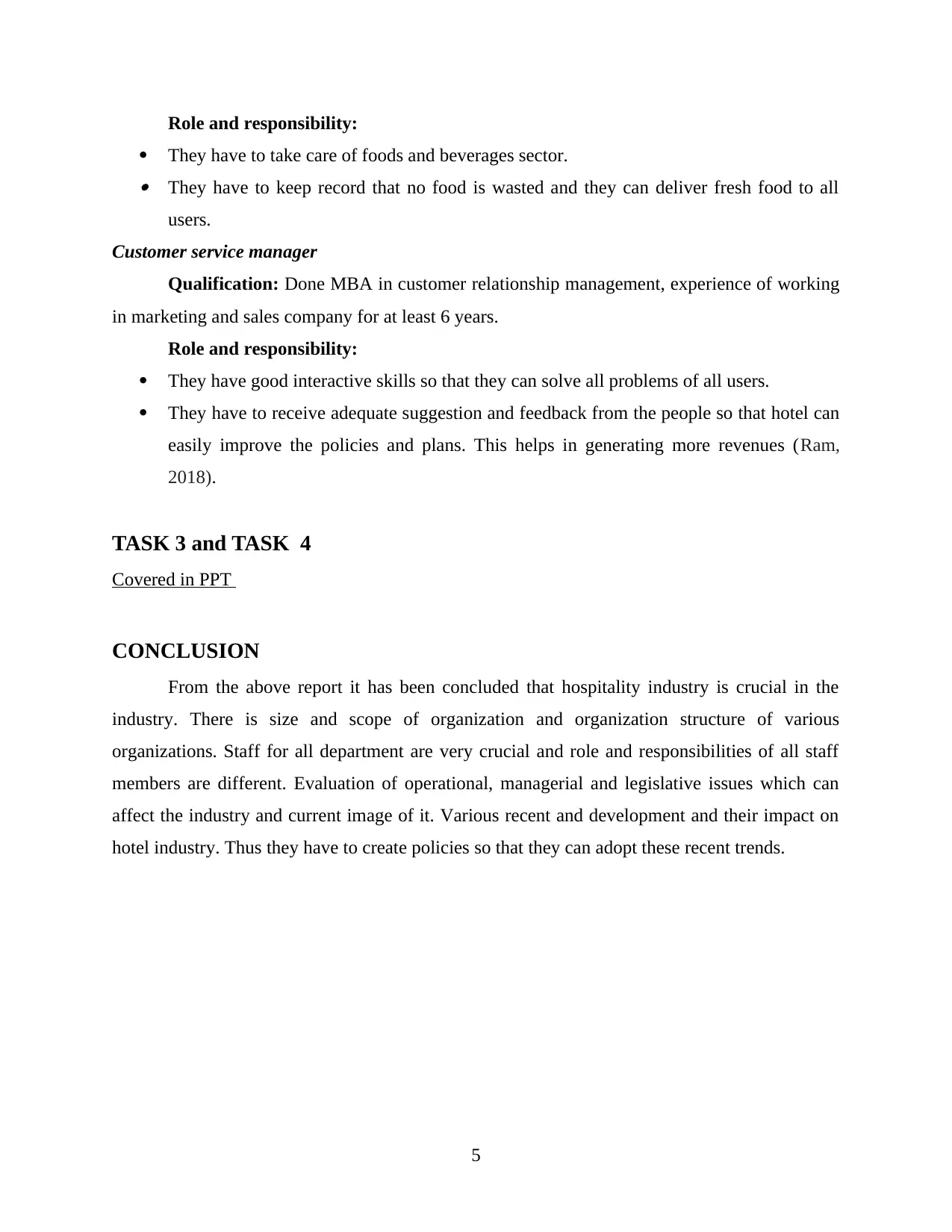
Role and responsibility:
They have to take care of foods and beverages sector. They have to keep record that no food is wasted and they can deliver fresh food to all
users.
Customer service manager
Qualification: Done MBA in customer relationship management, experience of working
in marketing and sales company for at least 6 years.
Role and responsibility:
They have good interactive skills so that they can solve all problems of all users.
They have to receive adequate suggestion and feedback from the people so that hotel can
easily improve the policies and plans. This helps in generating more revenues (Ram,
2018).
TASK 3 and TASK 4
Covered in PPT
CONCLUSION
From the above report it has been concluded that hospitality industry is crucial in the
industry. There is size and scope of organization and organization structure of various
organizations. Staff for all department are very crucial and role and responsibilities of all staff
members are different. Evaluation of operational, managerial and legislative issues which can
affect the industry and current image of it. Various recent and development and their impact on
hotel industry. Thus they have to create policies so that they can adopt these recent trends.
5
They have to take care of foods and beverages sector. They have to keep record that no food is wasted and they can deliver fresh food to all
users.
Customer service manager
Qualification: Done MBA in customer relationship management, experience of working
in marketing and sales company for at least 6 years.
Role and responsibility:
They have good interactive skills so that they can solve all problems of all users.
They have to receive adequate suggestion and feedback from the people so that hotel can
easily improve the policies and plans. This helps in generating more revenues (Ram,
2018).
TASK 3 and TASK 4
Covered in PPT
CONCLUSION
From the above report it has been concluded that hospitality industry is crucial in the
industry. There is size and scope of organization and organization structure of various
organizations. Staff for all department are very crucial and role and responsibilities of all staff
members are different. Evaluation of operational, managerial and legislative issues which can
affect the industry and current image of it. Various recent and development and their impact on
hotel industry. Thus they have to create policies so that they can adopt these recent trends.
5
Paraphrase This Document
Need a fresh take? Get an instant paraphrase of this document with our AI Paraphraser
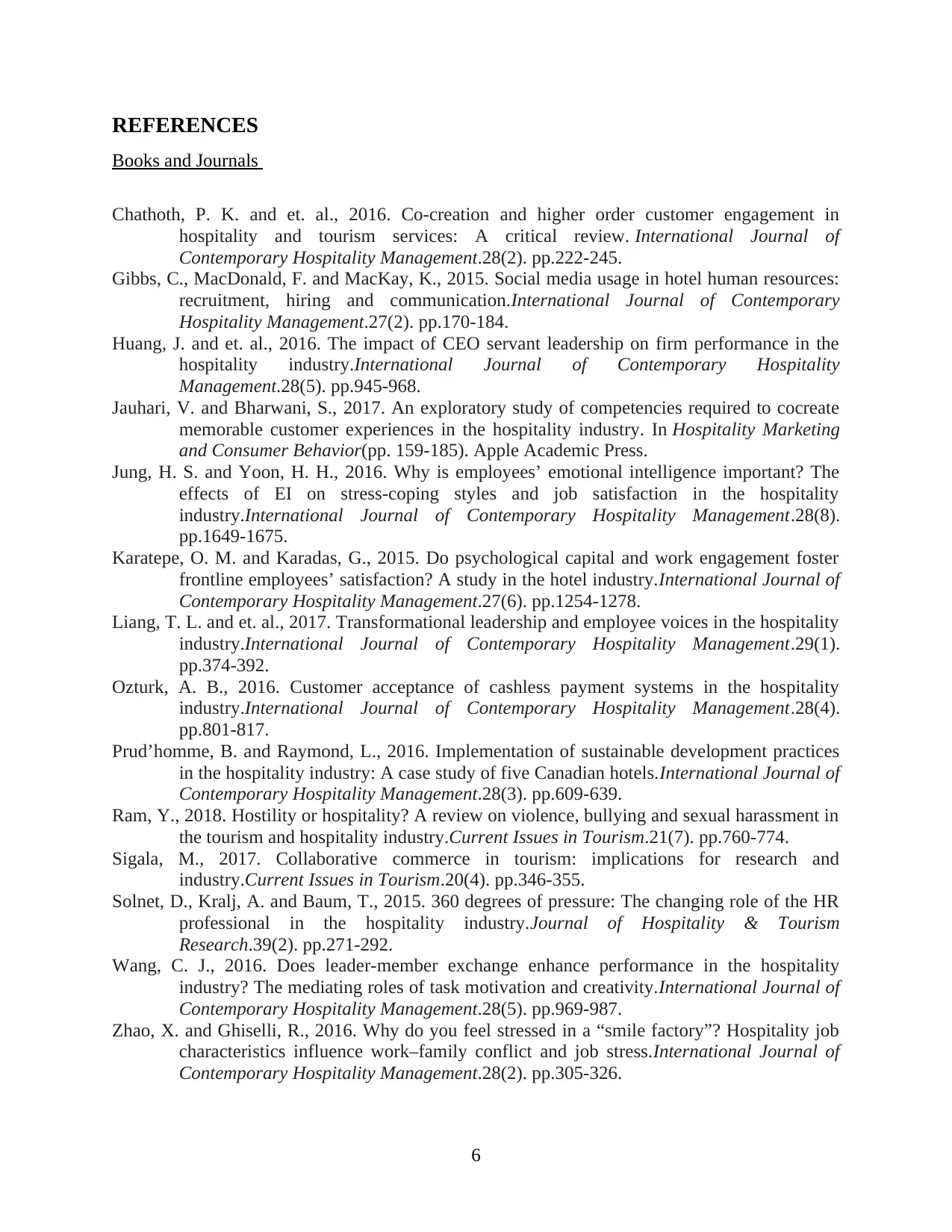
REFERENCES
Books and Journals
Chathoth, P. K. and et. al., 2016. Co-creation and higher order customer engagement in
hospitality and tourism services: A critical review. International Journal of
Contemporary Hospitality Management.28(2). pp.222-245.
Gibbs, C., MacDonald, F. and MacKay, K., 2015. Social media usage in hotel human resources:
recruitment, hiring and communication.International Journal of Contemporary
Hospitality Management.27(2). pp.170-184.
Huang, J. and et. al., 2016. The impact of CEO servant leadership on firm performance in the
hospitality industry.International Journal of Contemporary Hospitality
Management.28(5). pp.945-968.
Jauhari, V. and Bharwani, S., 2017. An exploratory study of competencies required to cocreate
memorable customer experiences in the hospitality industry. In Hospitality Marketing
and Consumer Behavior(pp. 159-185). Apple Academic Press.
Jung, H. S. and Yoon, H. H., 2016. Why is employees’ emotional intelligence important? The
effects of EI on stress-coping styles and job satisfaction in the hospitality
industry.International Journal of Contemporary Hospitality Management.28(8).
pp.1649-1675.
Karatepe, O. M. and Karadas, G., 2015. Do psychological capital and work engagement foster
frontline employees’ satisfaction? A study in the hotel industry.International Journal of
Contemporary Hospitality Management.27(6). pp.1254-1278.
Liang, T. L. and et. al., 2017. Transformational leadership and employee voices in the hospitality
industry.International Journal of Contemporary Hospitality Management.29(1).
pp.374-392.
Ozturk, A. B., 2016. Customer acceptance of cashless payment systems in the hospitality
industry.International Journal of Contemporary Hospitality Management.28(4).
pp.801-817.
Prud’homme, B. and Raymond, L., 2016. Implementation of sustainable development practices
in the hospitality industry: A case study of five Canadian hotels.International Journal of
Contemporary Hospitality Management.28(3). pp.609-639.
Ram, Y., 2018. Hostility or hospitality? A review on violence, bullying and sexual harassment in
the tourism and hospitality industry.Current Issues in Tourism.21(7). pp.760-774.
Sigala, M., 2017. Collaborative commerce in tourism: implications for research and
industry.Current Issues in Tourism.20(4). pp.346-355.
Solnet, D., Kralj, A. and Baum, T., 2015. 360 degrees of pressure: The changing role of the HR
professional in the hospitality industry.Journal of Hospitality & Tourism
Research.39(2). pp.271-292.
Wang, C. J., 2016. Does leader-member exchange enhance performance in the hospitality
industry? The mediating roles of task motivation and creativity.International Journal of
Contemporary Hospitality Management.28(5). pp.969-987.
Zhao, X. and Ghiselli, R., 2016. Why do you feel stressed in a “smile factory”? Hospitality job
characteristics influence work–family conflict and job stress.International Journal of
Contemporary Hospitality Management.28(2). pp.305-326.
6
Books and Journals
Chathoth, P. K. and et. al., 2016. Co-creation and higher order customer engagement in
hospitality and tourism services: A critical review. International Journal of
Contemporary Hospitality Management.28(2). pp.222-245.
Gibbs, C., MacDonald, F. and MacKay, K., 2015. Social media usage in hotel human resources:
recruitment, hiring and communication.International Journal of Contemporary
Hospitality Management.27(2). pp.170-184.
Huang, J. and et. al., 2016. The impact of CEO servant leadership on firm performance in the
hospitality industry.International Journal of Contemporary Hospitality
Management.28(5). pp.945-968.
Jauhari, V. and Bharwani, S., 2017. An exploratory study of competencies required to cocreate
memorable customer experiences in the hospitality industry. In Hospitality Marketing
and Consumer Behavior(pp. 159-185). Apple Academic Press.
Jung, H. S. and Yoon, H. H., 2016. Why is employees’ emotional intelligence important? The
effects of EI on stress-coping styles and job satisfaction in the hospitality
industry.International Journal of Contemporary Hospitality Management.28(8).
pp.1649-1675.
Karatepe, O. M. and Karadas, G., 2015. Do psychological capital and work engagement foster
frontline employees’ satisfaction? A study in the hotel industry.International Journal of
Contemporary Hospitality Management.27(6). pp.1254-1278.
Liang, T. L. and et. al., 2017. Transformational leadership and employee voices in the hospitality
industry.International Journal of Contemporary Hospitality Management.29(1).
pp.374-392.
Ozturk, A. B., 2016. Customer acceptance of cashless payment systems in the hospitality
industry.International Journal of Contemporary Hospitality Management.28(4).
pp.801-817.
Prud’homme, B. and Raymond, L., 2016. Implementation of sustainable development practices
in the hospitality industry: A case study of five Canadian hotels.International Journal of
Contemporary Hospitality Management.28(3). pp.609-639.
Ram, Y., 2018. Hostility or hospitality? A review on violence, bullying and sexual harassment in
the tourism and hospitality industry.Current Issues in Tourism.21(7). pp.760-774.
Sigala, M., 2017. Collaborative commerce in tourism: implications for research and
industry.Current Issues in Tourism.20(4). pp.346-355.
Solnet, D., Kralj, A. and Baum, T., 2015. 360 degrees of pressure: The changing role of the HR
professional in the hospitality industry.Journal of Hospitality & Tourism
Research.39(2). pp.271-292.
Wang, C. J., 2016. Does leader-member exchange enhance performance in the hospitality
industry? The mediating roles of task motivation and creativity.International Journal of
Contemporary Hospitality Management.28(5). pp.969-987.
Zhao, X. and Ghiselli, R., 2016. Why do you feel stressed in a “smile factory”? Hospitality job
characteristics influence work–family conflict and job stress.International Journal of
Contemporary Hospitality Management.28(2). pp.305-326.
6
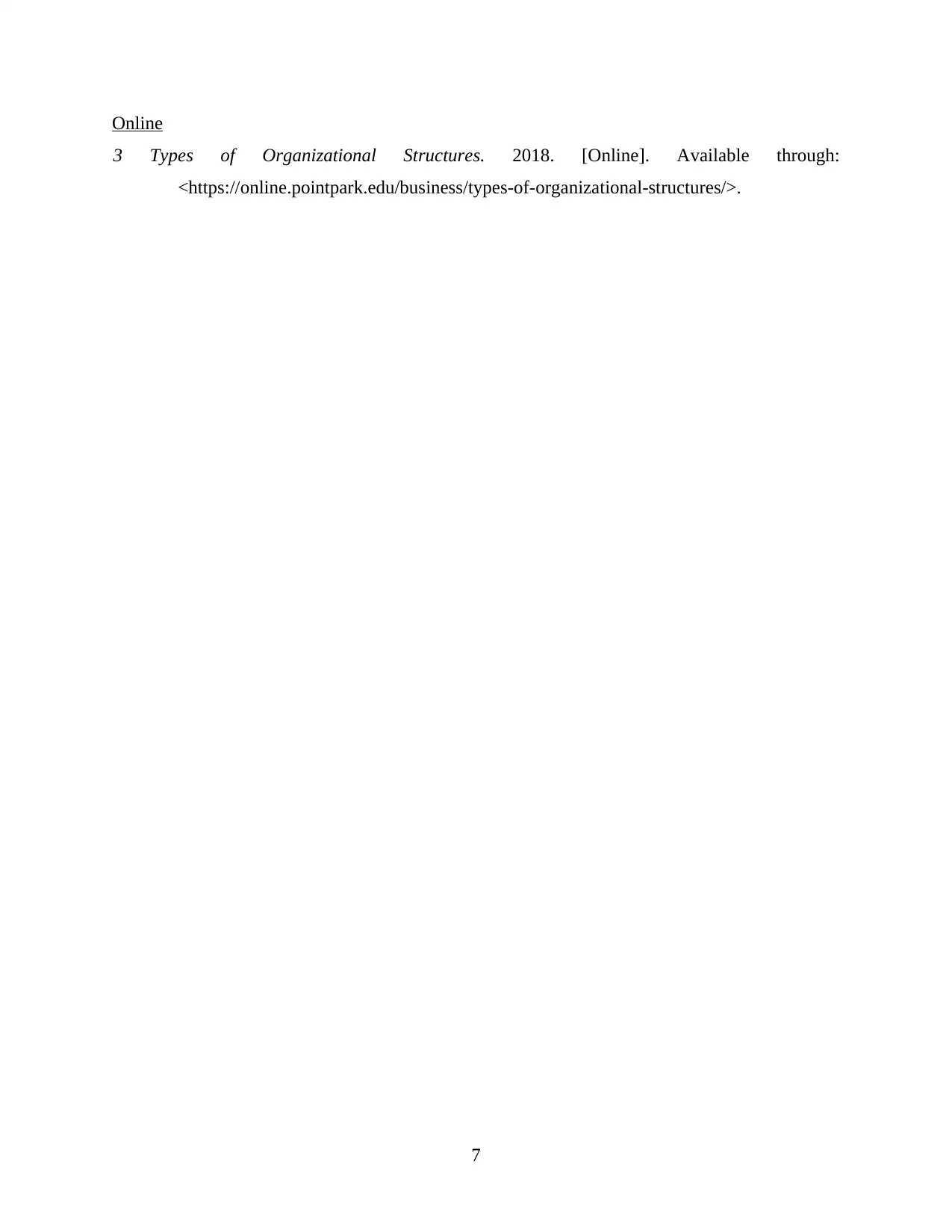
Online
3 Types of Organizational Structures. 2018. [Online]. Available through:
<https://online.pointpark.edu/business/types-of-organizational-structures/>.
7
3 Types of Organizational Structures. 2018. [Online]. Available through:
<https://online.pointpark.edu/business/types-of-organizational-structures/>.
7
⊘ This is a preview!⊘
Do you want full access?
Subscribe today to unlock all pages.

Trusted by 1+ million students worldwide
1 out of 9
Related Documents
Your All-in-One AI-Powered Toolkit for Academic Success.
+13062052269
info@desklib.com
Available 24*7 on WhatsApp / Email
![[object Object]](/_next/static/media/star-bottom.7253800d.svg)
Unlock your academic potential
Copyright © 2020–2026 A2Z Services. All Rights Reserved. Developed and managed by ZUCOL.





